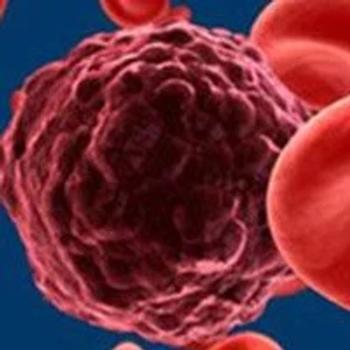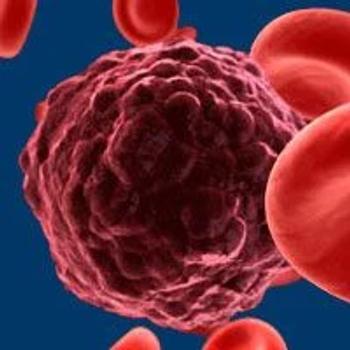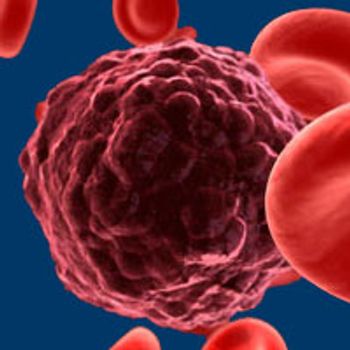
A supplemental new drug application has been submitted to the FDA for the combination of cabozantinib and nivolumab as a treatment for patients with advanced renal cell carcinoma.

Your AI-Trained Oncology Knowledge Connection!


A supplemental new drug application has been submitted to the FDA for the combination of cabozantinib and nivolumab as a treatment for patients with advanced renal cell carcinoma.

The FDA has granted a priority review designation to a new drug application for umbralisib for the treatment of patients with previously treated marginal zone lymphoma who have received at least 1 prior anti-CD20–based treatment.

Sintilimab injection plus pemetrexed and platinum-based therapy led to a statistically significant improvement in progression-free survival compared with chemotherapy alone as a first-line treatment for patients with locally advanced or metastatic nonsquamous non–small cell lung cancer.

The FDA has approved belantamab mafodotin-blmf (Blenrep) as a treatment for patients with relapsed/refractory multiple myeloma who have received 4 prior therapies, including an immunomodulatory drug, a proteasome inhibitor, and an anti-CD38 antibody.

The European Commission has approved entrectinib for the treatment of adult and pediatric patients ≥12 years of age with solid tumors that harbor an NTRK fusion, as well as for the treatment of adult patients with ROS1-positive, advanced non—small cell lung cancer not previously treated with ROS1 inhibitors.

The FDA has granted a breakthrough therapy designation to osimertinib for the adjuvant treatment of patients with stage IB, II, and IIIA EGFR-mutated non–small cell lung cancer following complete resection with curative intent.

The FDA has approved the CAR T-cell therapy brexucabtagene autoleucel (Tecartus; formerly KTE-X19) as a treatment for adult patients with relapsed/refractory mantle cell lymphoma.

The disease-free survival benefit observed with the third-generation EGFR TKI osimertinib as an adjuvant treatment in patients with EGFR-mutant non–small cell lung cancer in the phase 3 ADAURA trial is striking.

Ruxolitinib was found to demonstrate a superior objective response rate at 24 weeks compared with best available therapy in patients with steroid-refractory or steroid-dependent chronic graft-versus-host-disease, meeting the primary end point of the phase 3 REACH3 trial.

The optimal sequence of therapies for patients with metastatic HER2-positive breast cancer must be an individualized one, and should be dependent on the presence and/or level of central nervous system disease.

The FDA’s Oncologic Drugs Advisory Committee voted 12 to 0 in favor of approving belantamab mafodotin for the treatment of patients with relapsed/refractory multiple myeloma who have previously received at least 4 prior therapies, including an immunomodulatory drug, a proteasome inhibitor, and a CD38-directed antibody.

The European Commission has approved single-agent olaparib as a maintenance treatment for adult patients with germline BRCA1/2-mutant metastatic pancreatic adenocarcinoma who have not progressed after a minimum of 16 weeks of a frontline platinum-based chemotherapy regimen.

Patient recruitment has been discontinued to an interim futility analysis of a phase 3 trial evaluating pracinostat in combination with azacitidine in patients with acute myeloid leukemia demonstrated that it is unlikely to meet the primary end point of overall survival compared with a control arm.

Following the arrival of the coronavirus disease 2019 pandemic, St. Jude Children's Research Hospital launched the first Global COVID-19 Observatory and Resource Center for Childhood Cancer.

The neoadjuvant combination of nivolumab and ipilimumab continues to demonstrate a benefit in RFS compared with the combination given in the adjuvant setting in patients with stage III macroscopic melanoma.

Tiragolumab in combination with atezolizumab (Tecentriq) demonstrated early clinical activity and was found to be well tolerated in patients with advanced solid tumors, including those with metastatic non–small cell lung cancer who were PD-L1 positive and had not received prior checkpoint inhibition.

The combination of atezolizumab plus carboplatin/etoposide continued to demonstrate an improvement in overall survival versus chemotherapy alone as a frontline treatment for patients with extensive-stage small cell lung cancer.

The FDA has granted a priority review designation to a new drug application for relugolix as a treatment for patients with advanced prostate cancer.

The National Medical Products Administration in China has approved pembrolizumab for the treatment of patients with locally advanced or metastatic esophageal squamous cell carcinoma whose tumors express PD-L1 as determined by an approved test, following disease progression on 1 prior line of systemic therapy.

The addition of the individualized neoantigen specific immunotherapy RO7198457 to atezolizumab induced neoantigen-specific T-cell responses, and was found to be well tolerated in patients with advanced solid malignancies.

The combination of ipatasertib plus abiraterone acetate and prednisone/prednisolone improved radiographic progression-free survival compared with standard treatment plus placebo in patients with metastatic castration-resistant prostate cancer who have PTEN loss.

The combination of atezolizumab and nab-paclitaxel, followed by doxorubicin and cyclophosphamide, demonstrated a statistically significant and clinically meaningful improvement in pathological complete response compared with placebo plus chemotherapy as a neoadjuvant treatment for patients with early triple-negative breast cancer, regardless of PD-L1 expression.

A new drug application has been completed and submitted to the FDA for the accelerated approval of umbralisib as a treatment for patients with previously treated MZL and follicular lymphoma.

The FDA has granted a fast track designation to liposomal irinotecan for use in combination with 5-fluorouracil/leucovorin and oxaliplatin as a treatment for patients with previously untreated, unresectable, locally advanced or metastatic pancreatic ductal adenocarcinoma.

Abemaciclib in combination with standard adjuvant endocrine therapy demonstrated a significant improvement in invasive disease-free survival compared with endocrine therapy alone in patients with high-risk, HR-positive, HER2-negative early breast cancer.

The combination of plinabulin and pegfilgrastim showed a significant enhancement in the rate of grade 4 neutropenia prevention compared with pegfilgrastim alone in patients undergoing chemotherapy, meeting the primary end point of a prespecified interim analysis of the phase 3 PROTECTIVE-2 trial.

The triplet therapy of isatuximab-irfc, carfilzomib, and dexamethasone showed a statistically significant improvement in PFS versus carfilzomib and dexamethasone alone in patients with relapsed/refractory multiple myeloma.

Treatment with narsoplimab (OMS721) led to complete responses, improved laboratory markers, and encouraging 100-day survival rates in patients diagnosed with hematopoietic stem cell transplant-thrombotic microangiopathy.

The triplet regimen of ibrutinib, venetoclax, and obinutuzumab demonstrated encouraging response rates with an acceptable safety profile in treatment-naïve patients with high-risk chronic lymphocytic leukemia.

Andrew M. Evens, DO, MSc, discusses the telemedicine initiatives that have been taken at RCINJ—even before the COVID-19 outbreak—as well as proper telemedicine etiquette and best practices for oncologists getting a handle on the new approach in clinical practice.

Published: June 24th 2020 | Updated:

Published: July 23rd 2020 | Updated:

Published: June 22nd 2020 | Updated:

Published: June 24th 2020 | Updated:

Published: July 24th 2020 | Updated:

Published: May 21st 2020 | Updated: